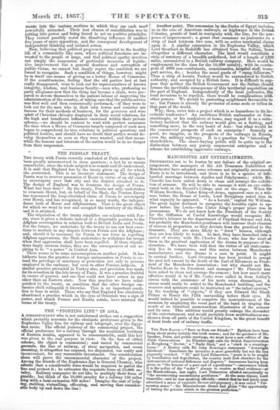THE "FIGHTING LINE" EV ASIA.
A CORRESPONDENT who is not uninformed strikes out a suggestion 'which probably accounts for the obstinate preference given to the Euphrates Valley line for railway and telegraph, over the Egypan route. The official jealousy of the commercial project, the official preference for a railway through the wealthiest territory of Eastern Arabia, appeared to be unaccountable, until this key was given to the real purpose in view. On the face of either scheme, the object is commercial; and tasted by commercial grounds, the line of railway, of river navigation, and ocean steaming, is altogether too exposed, too disjointed, too oostly and inconvenient, for any reasonable investment. One consideration alone will prove the uncommercial character of the project. Among the friends of the Euphrates line is General Chesney, who admits that a considerable force would be required to patrol the line and protect it ; he estimates the requisite force at 10,000 cavalry. Railway companies do not like to multiply their force of guards ; but think of the 10,000 cavalry for a railway 150 miles Long with a boat-extension 800 miles! Imagine the cost of lodgmg, stabling, victualling, officering, and moving that considerable body up and down the line ! Another point. The concession by the Pasha of Ekypt includes, as in the case of American railway's, or highways in the British Colonies, grants of land. in. contiguity with the line for the purposes of improvement ; a grant that occasions no jealousies on a strip of land between two seas, with no active territorial claims upon it. A similar concession in the Euphrates Valley, which Lord Stratford de Bedell& has obtained from the Sultan, bears altogether a different character. The land would constitute a strip of territory of a breadth undefined, but of a length of 1233 miles, surrendered to a British railway company. Here would be employment for the time for the 10,000 cavalry, with its contingent of 5000 non-combatants, commissaries, hospital staff, transport service, drc. • besides the usual quota of ' camp followers." Th.us a strip of isiatio Turkey would be surrendered to British authority, and occupied by a British force. It is difficult to suppose that neither the British Government nor the Sultan should foresee the inevitable consequence of this territorial aoquisition on the part ofEngland. Independently of the local jealousies, the local invasions to be repelled, there would be complications with other powers. We should be protecting neighbours favourable to us; but France is already the protector of some sects or tribes in that part of the world. Why, then, enter into a project which is so hazardous in its inevitable tendencies ? An ambitious British ambassador at Constantinople, or his coadjutors at home may regard it as a satisfactory incident that the railway wouid give us a footing, and something more, in the very heart of Asia: but what would be the commercial prospects of such an enterprise ? Scarcely so good, we imagine, as the prospects of the railways in Russia, oven the military railways. It is a question for "intending" shareholders. The share-buying public will be quite up to the distinction between any purely commercial enterprise and a scheme for establishing aggressive railways.


























 Previous page
Previous page